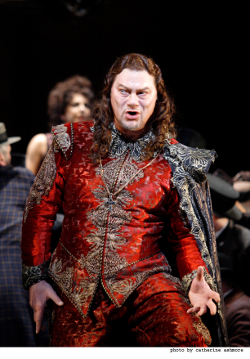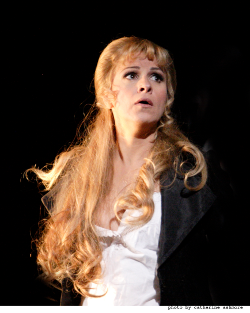![Vittorio Grigolo as Faust [Photo by Catherine Ashmore courtesy of Royal Opera House]](http://www.operatoday.com/Faust_ROH_2011_01.png)
28 Sep 2011
Faust, Royal Opera House
When the Royal Opera House London does things well, it does them very well indeed. This Gounod’s Faust was a sizzler!
English Touring Opera are delighted to announce a season of lyric monodramas to tour nationally from October to December. The season features music for solo singer and piano by Argento, Britten, Tippett and Shostakovich with a bold and inventive approach to making opera during social distancing.
This tenth of ten Live from London concerts was in fact a recorded live performance from California. It was no less enjoyable for that, and it was also uplifting to learn that this wasn’t in fact the ‘last’ LfL event that we will be able to enjoy, courtesy of VOCES8 and their fellow vocal ensembles (more below …).
Ever since Wigmore Hall announced their superb series of autumn concerts, all streamed live and available free of charge, I’d been looking forward to this song recital by Ian Bostridge and Imogen Cooper.
The Sixteen continues its exploration of Henry Purcell’s Welcome Songs for Charles II. As with Robert King’s pioneering Purcell series begun over thirty years ago for Hyperion, Harry Christophers is recording two Welcome Songs per disc.
Although Stile Antico’s programme article for their Live from London recital introduced their selection from the many treasures of the English Renaissance in the context of the theological debates and upheavals of the Tudor and Elizabethan years, their performance was more evocative of private chamber music than of public liturgy.
In February this year, Albanian soprano Ermonela Jaho made a highly lauded debut recital at Wigmore Hall - a concert which both celebrated Opera Rara’s 50th anniversary and honoured the career of the Italian soprano Rosina Storchio (1872-1945), the star of verismo who created the title roles in Leoncavallo’s La bohème and Zazà, Mascagni’s Lodoletta and Puccini’s Madama Butterfly.
Evidently, face masks don’t stifle appreciative “Bravo!”s. And, reducing audience numbers doesn’t lower the volume of such acclamations. For, the audience at Wigmore Hall gave soprano Elizabeth Llewellyn and pianist Simon Lepper a greatly deserved warm reception and hearty response following this lunchtime recital of late-Romantic song.
Collapsology. Or, perhaps we should use the French word ‘Collapsologie’ because this is a transdisciplinary idea pretty much advocated by a series of French theorists - and apparently, mostly French theorists. It in essence focuses on the imminent collapse of modern society and all its layers - a series of escalating crises on a global scale: environmental, economic, geopolitical, governmental; the list is extensive.
For this week’s Live from London vocal recital we moved from the home of VOCES8, St Anne and St Agnes in the City of London, to Kings Place, where The Sixteen - who have been associate artists at the venue for some time - presented a programme of music and words bound together by the theme of ‘reflection’.
'Such is your divine Disposation that both you excellently understand, and royally entertaine the Exercise of Musicke.’
Amongst an avalanche of new Mahler recordings appearing at the moment (Das Lied von der Erde seems to be the most favoured, with three) this 1991 Mahler Second from the 2nd Kassel MahlerFest is one of the more interesting releases.
‘And there was war in heaven: Michael and his angels fought against the dragon; and the dragon fought and his angels, And prevailed not; neither was their place found any more in heaven … that old serpent … Satan, which deceiveth the whole world: he was cast out into the earth, and his angels were cast out with him.’
If there is one myth, it seems believed by some people today, that probably needs shattering it is that post-war recordings or performances of Wagner operas were always of exceptional quality. This 1949 Hamburg Tristan und Isolde is one of those recordings - though quite who is to blame for its many problems takes quite some unearthing.
There was never any doubt that the fifth of the twelve Met Stars Live in Concert broadcasts was going to be a palpably intense and vivid event, as well as a musically stunning and theatrically enervating experience.
‘Love’ was the theme for this Live from London performance by Apollo5. Given the complexity and diversity of that human emotion, and Apollo5’s reputation for versatility and diverse repertoire, ranging from Renaissance choral music to jazz, from contemporary classical works to popular song, it was no surprise that their programme spanned 500 years and several musical styles.
The Academy of St Martin in the Fields have titled their autumn series of eight concerts - which are taking place at 5pm and 7.30pm on two Saturdays each month at their home venue in Trafalgar Square, and being filmed for streaming the following Thursday - ‘re:connect’.
The London Symphony Orchestra opened their Autumn 2020 season with a homage to Oliver Knussen, who died at the age of 66 in July 2018. The programme traced a national musical lineage through the twentieth century, from Britten to Knussen, on to Mark-Anthony Turnage, and entwining the LSO and Rattle too.
With the Live from London digital vocal festival entering the second half of the series, the festival’s host, VOCES8, returned to their home at St Annes and St Agnes in the City of London to present a sequence of ‘Choral Dances’ - vocal music inspired by dance, embracing diverse genres from the Renaissance madrigal to swing jazz.
Just a few unison string wriggles from the opening of Mozart’s overture to Le nozze di Figaro are enough to make any opera-lover perch on the edge of their seat, in excited anticipation of the drama in music to come, so there could be no other curtain-raiser for this Gala Concert at the Royal Opera House, the latest instalment from ‘their House’ to ‘our houses’.
"Before the ending of the day, creator of all things, we pray that, with your accustomed mercy, you may watch over us."
![Vittorio Grigolo as Faust [Photo by Catherine Ashmore courtesy of Royal Opera House]](http://www.operatoday.com/Faust_ROH_2011_01.png)
When the Royal Opera House London does things well, it does them very well indeed. This Gounod’s Faust was a sizzler!
A stellar cast — Angela Gheorghiu, Vittorio Grigolo, René Pape and Dmitri Hvorostovsky — made this a sense of occasion, although the production, by David McVicar, was first seen in 2004. The performance worked well because there was good integration of all elements that contribute towards operatic experience — singing, staging, acting and orchestra. Following on from the superb Puccini Il trittico (reviewed here), it made for a spectacular start to the 2011/2 season at the Royal Opera House, London.
McVicar himself wasn’t present, but revival director Lee Blakely must have inspired the cast, for they were singing with great panache. Perhaps a little too much at times, for both Gheorghiu and Grigolo threw themselves so passionately into their parts that at times, there were weaknesses. But better this enthusiasm than technically note-perfect and dull. Faust and Marguerite don’t have Méphistophélès’s demonic powers, but they beat him in the end.
 René Pape as Méphistofèlés
René Pape as Méphistofèlés
It was touching to see how genuinely happy Gheorghiu seemed to be when she comes upon the jewel box and forgets the studied froideur, with which she sang “The Song of the King of Thule.” If her diction wavers, it’s not entirely out of context. Gheorghiu’s Marguerite, despite the unflattering blonde wig, is sympathetic. Faust’s sacrificing love becomes altogether plausible.
Faust stretches Vittorio Grigolo vocally, but he compensates with expressive acting. His bright, exuberant timbre creates a Faust who’s hypnotized by the excitement of being young, a junkie to the thrill of new sensations. Thus he fits well with René Pape’s suave Méphistophélès. This opera is as much about social values as metaphysical struggle, so Pape’s sophisticated “French” urbanity may indeed be preferable. The humour in the plot, and the dogged cheerfulness in much of the orchestral writing indicates a lighter touch than obvious melodramatic malevolence.
Gounod’s long sequences for ballet are integral to the opera because, like the mercurial scene changes, they add sparkling wit. The witches in Walpurgis Night aren’t ugly crones but seductive ballerinas, who in this production have an orgy with the male patrons of the ballet. Just as Faust is tempted by sex, and Méphistophélès is repelled by Marthe (Carole Wilson)’s generous offer, so were audiences in Gounod’s time titilliated by tutus and dancers of easy virtue. These “witches” are free spirits of nature. Margeurite and Faust do what comes naturally. When Méphistophélès sings about “Reines de beauté, de l’antiquité”, Pape wears a woman’s black gown. Perhaps the reference is to Ortrud and her ancient gods, but more likely it connects to Goethe’s Eternal Feminine, temporarily usurped by Satan.
 Angela Gheorghiu as Marguérite
Angela Gheorghiu as Marguérite
Hence the creation of Siébel as trouser role (Michèle Losier,). Nothing is quite what it appears to be in this moral universe. Even the “sculpture” in the church turns out to be Méphistophélès in a marble-coloured cape.
There’s a similar logic to Gounod’s emphasis on the military.context. It’s great theatre and the rousing march “Gloire immortelle” is justly famous. It expands the part of Valentin, Marguerite’s brother, for he symbolizes the moral force that stand up to Méphistophélè’s sensual wiles. Dmitri Hvorostovsky is luxury casting, and his big arias, especially the curse, were superbly dramatic. In this production, he also has to act a lot, both in the sword scenes and in the ballet, where now he’s one of the undead, and is tempted. Macabrely, by the dancers. Perhaps Valentin doesn’t have to be.young, but Valentin’s naivety is so much a part of the role that we should cherish Hvorostovsky while we can.
Stage designs, by Charles Edwards are sumptuous, but as usual, his designs “act” amplifying themes in the drama. Town transforms to church then to the Harz mountains and to the Théâtre Lyrique, as mercurially as Méphistophélès can transport Faust through time and place. Spartan gloom to gorgeous luxury to desolation, like Faust’s life. Marguerite’s redemption seems even more miraculous. There’s no need to lift her up to the ceiling. Gheorghiu lies still, lit in pristine simplicity.
So much in this opera depends on the orchestra and the choruses, and this we had in abundance. Evelino Pidò first conducted at the Royal Opera House in 1993, His experience and focus pulled all the elements of the performance together extremely well.
For more information, please see the Royal Opera House website.
Anne Ozorio